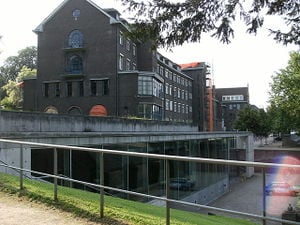
International Centre for Integrated assessment & Sustainable development (ICIS), at the Faculty of Humanities and Sciences, Maastricht University, was founded in 1998. ICIS addresses complex issues facing the planet and its inhabitants. Its aims to conduct research and provide education in the fields of integrated assessment and sustainable development.
Mission[edit | edit source]
ICIS scientists and researchers in the natural, social, and ___ sciences work in collaboration in pursuit of solutions to problems plaguing the world today. Their studies include the analysis of causes and effects (of appropriate technologies) and the connections which they share with economic, environmental, institutional and socio-cultural process associated with individual environments or complex issues (e.g. transportation, water, healthcare, tourism, etc.) Interdisciplinary analyses in tandem with participatory research involving stakeholders form the foundation for the growth of visions and long-term strategies. The mission of the centre is to support awareness processes with regard to integrative thinking and action in policy circles, the business community and society at large.[1][2]
Research[edit | edit source]
ICIS' research interest is best described as scientific research on sustainable development. This implies that within ICIS integrative studies are carried out on complex societal problems that involve economic, socio-cultural, environmental and institutional issues.
Methods[edit | edit source]
The central goal of ICIS is to improve on existing methodology and to discovery new methods and tools for Integrated Assessment. Current Integrated Assessment approaches at ICIS include: participatory methods, scenarios, transitions, indicator- analysis and modeling techniques.
Participatory methods
Integrated Assessment has precise participatory constraints, both through interaction by scientists from various disciplines as well as through participation of stakeholders and societal actors in the assessment process. 'Participatory methods' is a broad term for describing interactive approaches that actively involve a range of stakeholders.
Scenarios
Topics within this methodological track are among others: participatory techniques for scenario development, multi-scale scenarios, surprises, use of historical analogies in scenarios and internal consistency of scenarios
Transitions and transition-management
A transition can be described as a steady continuous process of change where the structural composition, integrity, character of society (or a complex sub-system of society) transforms. The transition notion seems to be useful to illustrate broad, long-term and structural societal changes and to explain their shared connection. The insight gained from transition-management can be used as a new approach to the management of complex policy problems.
Modelling techniques
Intergrated models are frameworks to organize and exhibit knowledge from a variety of disciplines, varying from conceptual models to computer simulations. These in turn amplify our insights into the present and future driving forces behind the complex structures in our society. The ultimate ambition of models is to serve as tools in integrative planning.
Topics of Research[edit | edit source]
This selection of topics is eccumilated by the priorities and research agendas of national and international research programs, and is further based on the particular expertise and interests of the scholars participating in ICIS. Current themes include but are not limited to, human health, water, tourism, mobility, globalisation, climate change, oceans, and regional development.
Human health
Global changes and the processes of globalization pose dangers, some unseen, to human health. A striking example is that changes in global climate may alter the distribution of vector-borne diseases (ones distributed by insects), such as malaria. An Integrated approach enables to produce the environmental, societal and human dimensions of such health issues and to explore the long-term potential health impacts associated with globalization.
Water
Water lends itself to an integrated approach because it includes a plethora of interconnected problems playing at different scale levels (water scarcity, water quality, water floods, water demand and supply and sea level rise). An integrated water assessment takes the context of socio-economic, cultural, institutional and environmental developments into consideration when researching specfic issues.
Tourism
Because tourism has long reaching effects across a range of sectors and unmistakably have an strong influece on both economic, social-cultural, ecological and institutional facets of society, fair and balanced evaluation of this trend have to be integrative by nature. This includes a comprehensive analysis of the driving forces, state changes and impacts of the expanding tourist industry and of possible response strategies. Current casestudy areas include Antarctica and European coustal zones.
Mobility
Mobility is one of the cornerstones of our society and business activities in the economy. The current transport system is plagued by a series of serious, persistent problems: congestion, pollution, traffic accidents leading to casualties, noise and fragmentation of landscapes in rural areas and loss of space in urban areas. In addition, transportation is a major energy consumer and contributor to anthropogenic climate change. ICIS aims to contribute to the current literature avaialbe that describes and explains the dynamics of change in a socio-technical change process, such as those in the mobility system. It also examines the role and possibilities of policy.
Biodiversity
Biodiversity is a finite stock of renewable natural resource assets. As human activity has an ever-increasing impact on the natural environment at large, this precious resource is of crucial importance for the resilience of ecosystems. Some of which directly support many economic sectors, such as forestry, agriculture and fisheries, pharmacy and eco-tourism, these constitute a pressing ecological constraint on economic activity. ICIS aims to enrich the concept of preserving ecosystem services in order to allow an integrated assessment of biodiversity.
Special thanks to Anja van Bogaert, managing director for ICIS for allowing me to use information, and photos from their site.
References[edit | edit source]
- ↑ International Centre for Integrative Studies. "About ICIS." Web. 23 Feb. 2011. <<http://web.archive.org/web/20180312071903/http://www.icis.unimaas.info:80/about-icis/>
- ↑ Integrated Assessment of Health Risk of Environmental Stressors in Europe. "International Centre for Integrative Studies Maastricht University" Web. 23 Feb. 2011. <<http://web.archive.org/web/20110827023557/http://www.intarese.org:80/about-us/partner/international-centre-integrative-studies-maastricht-university.htm>